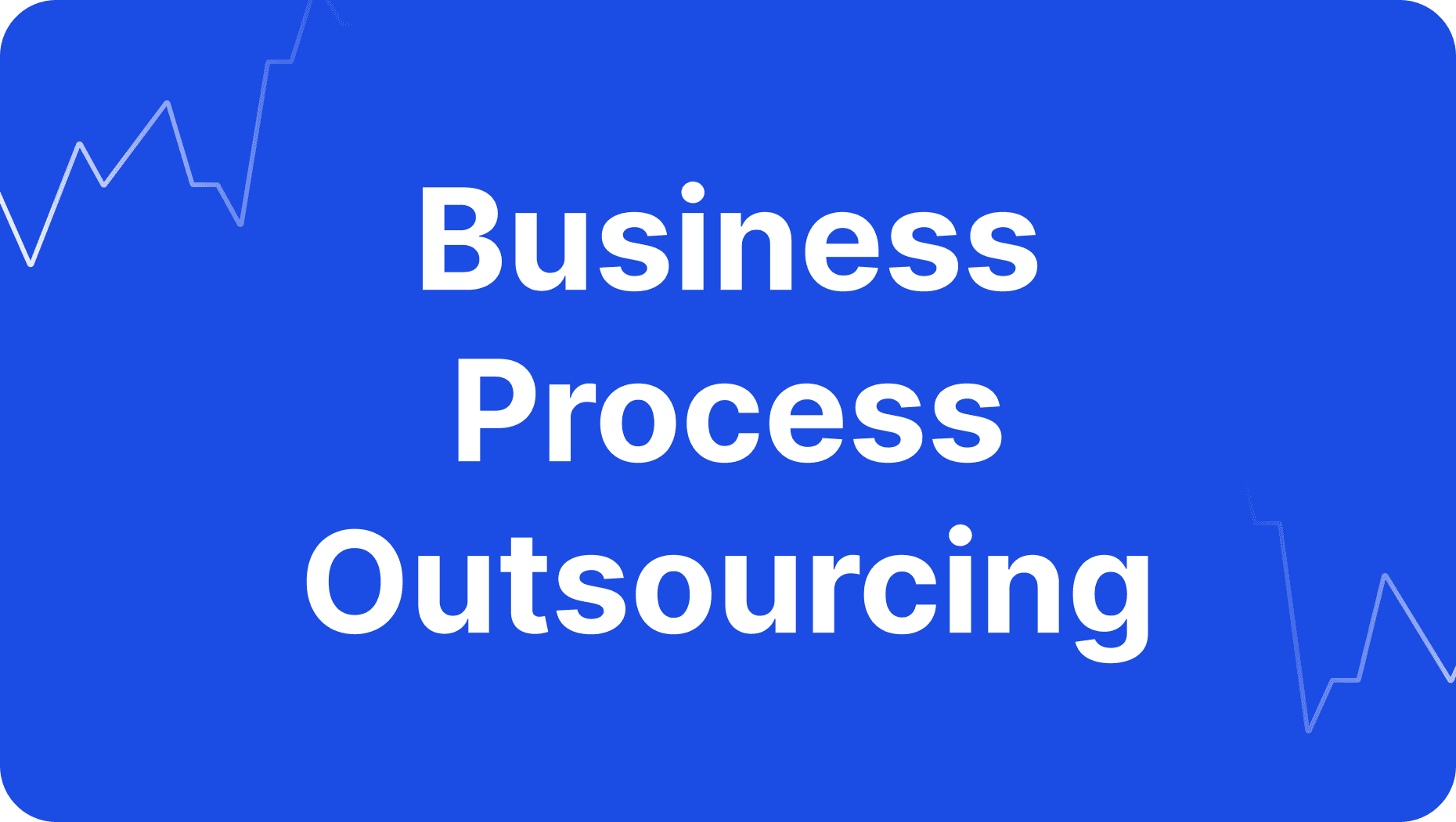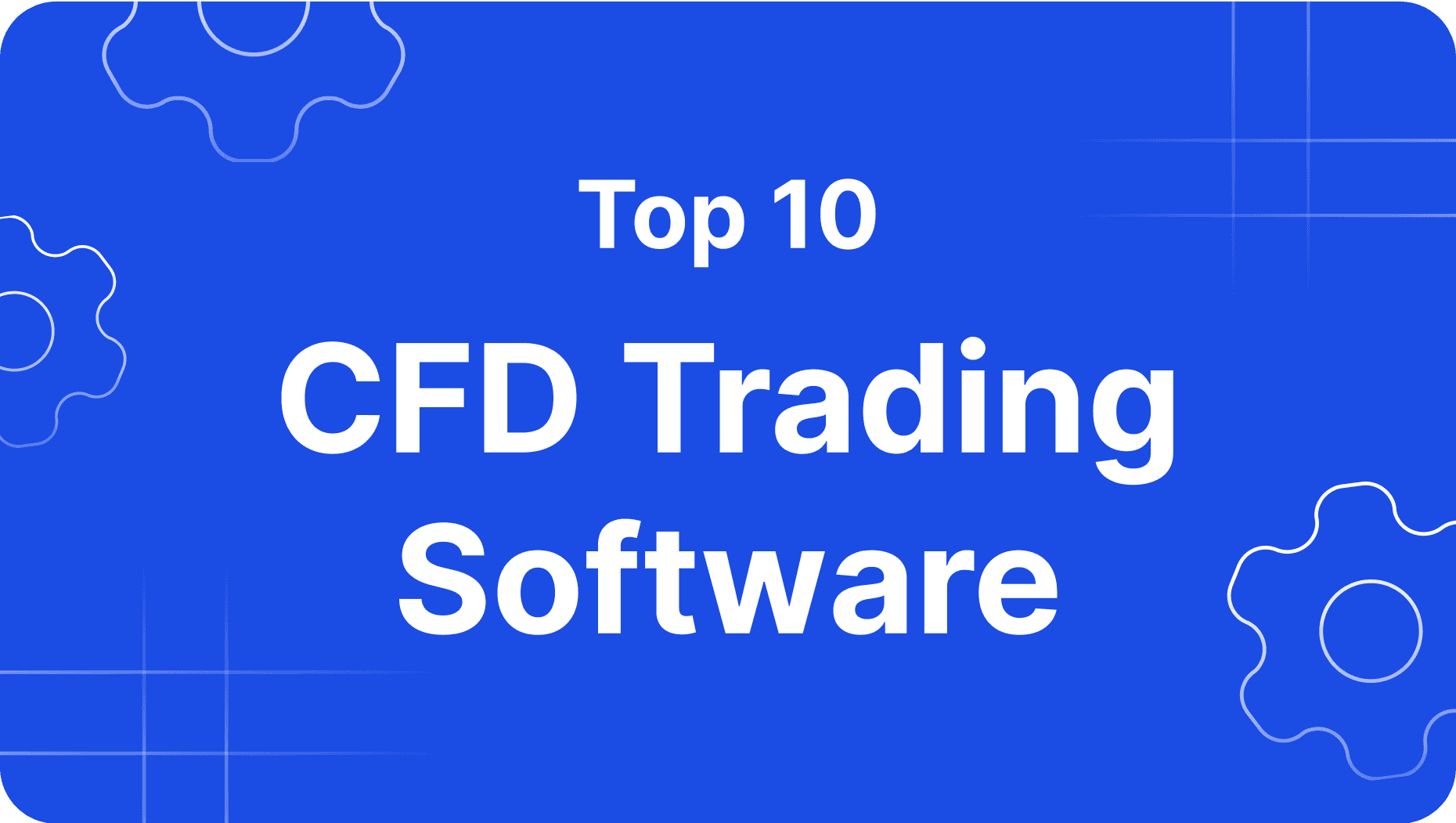Share
0
/5
(
0
)
In the current dynamic business landscape, organisations continually explore innovative strategies to enhance operational efficiency, minimise expenses, and improve overall productivity. Business process outsourcing (BPO) has surfaced as a vital strategy for achieving these objectives, enabling companies to transfer non-essential tasks to specialised service providers.
For startups aiming for rapid growth or established enterprises seeking to refine their operations, grasping the full potential of BPO may be crucial for discovering new avenues for expansion.
This article will examine BPO in its various forms and provide insights into assessing whether it aligns with your organisation's needs and goals.
Key Takeaways
BPO allows businesses to delegate non-core functions to external providers, enhancing operational efficiency, reducing costs, and accessing specialised expertise.
With technological advancements and globalisation, BPO services have expanded to include highly specialised tasks like data analysis, engineering, and legal support.
To determine if BPO is right for your business, assess operational needs, budget, provider reliability, and alignment with your long-term goals.
What is Business Process Outsourcing (BPO)?
BPO refers to the practice of contracting specific business functions or processes to external service providers. These processes can range from routine tasks like data entry, customer support, and payroll management to specialised operations such as accounting, IT services, and marketing. By outsourcing these tasks, companies can focus on their core activities, improve efficiency, and reduce operational costs.
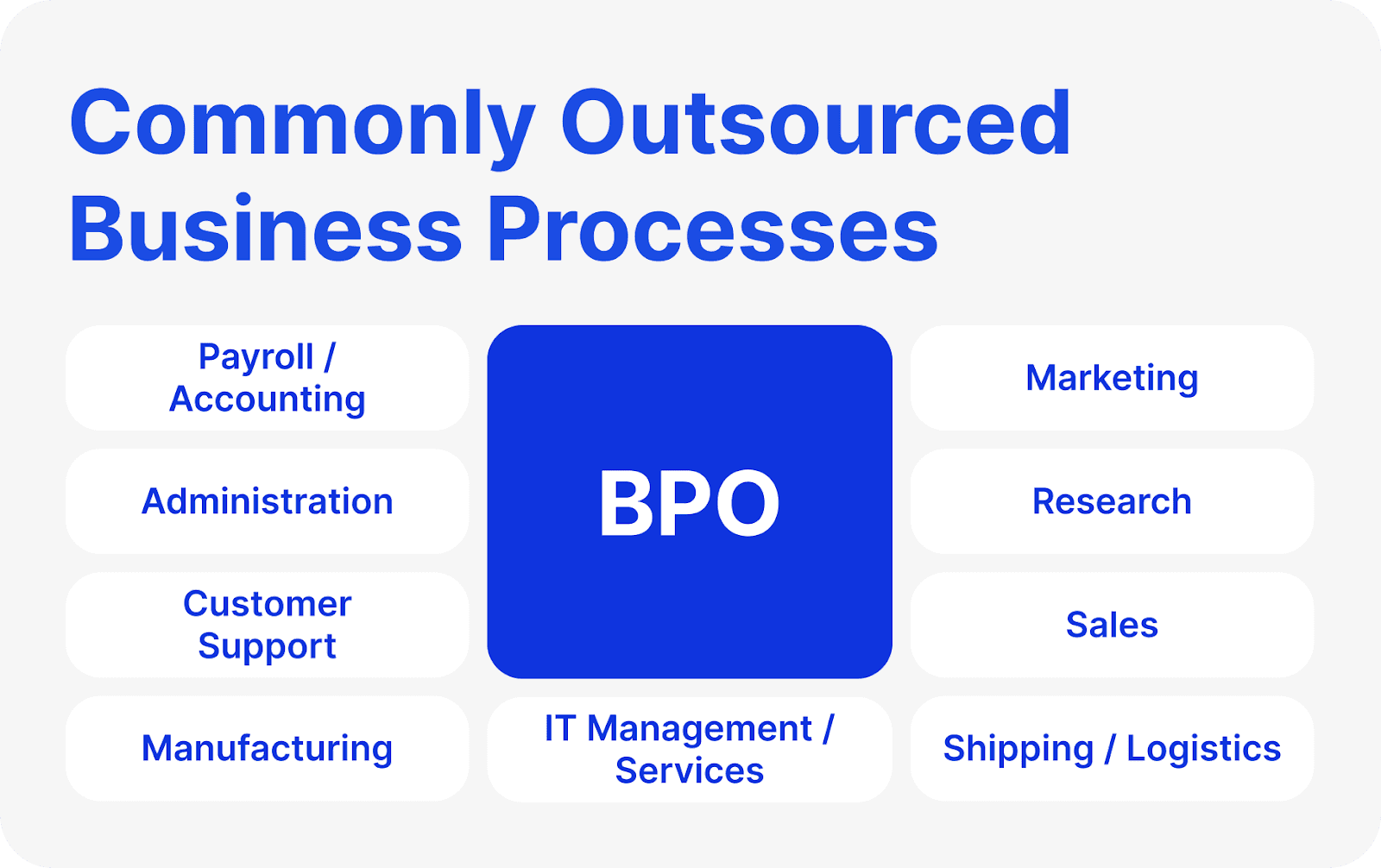
BPO is broadly divided into two categories: back-office outsourcing and front-office outsourcing. Back-office outsourcing involves internal business operations such as finance, human resources, and IT support. Front-office outsourcing, on the other hand, deals with customer-facing functions like call centre services, sales support, and marketing. This division allows businesses to outsource non-core activities while strategically retaining control over essential operations.
[aa quote-global]
Fast Fact
The global BPO industry is expected to surpass $350 billion by 2025, highlighting how businesses worldwide leverage outsourcing to drive innovation and efficiency.
[/aa]
BPO in Today’s Business Landscape
In recent years, BPO has evolved from simply being a cost-saving measure to becoming a business strategic tool. Modern BPO providers offer advanced technology, data-driven insights, and specialised expertise that help companies streamline operations, enhance customer experiences, and adapt to market changes. Companies across industries, from small startups to global corporations, leverage BPO services to stay competitive in a fast-paced business environment.
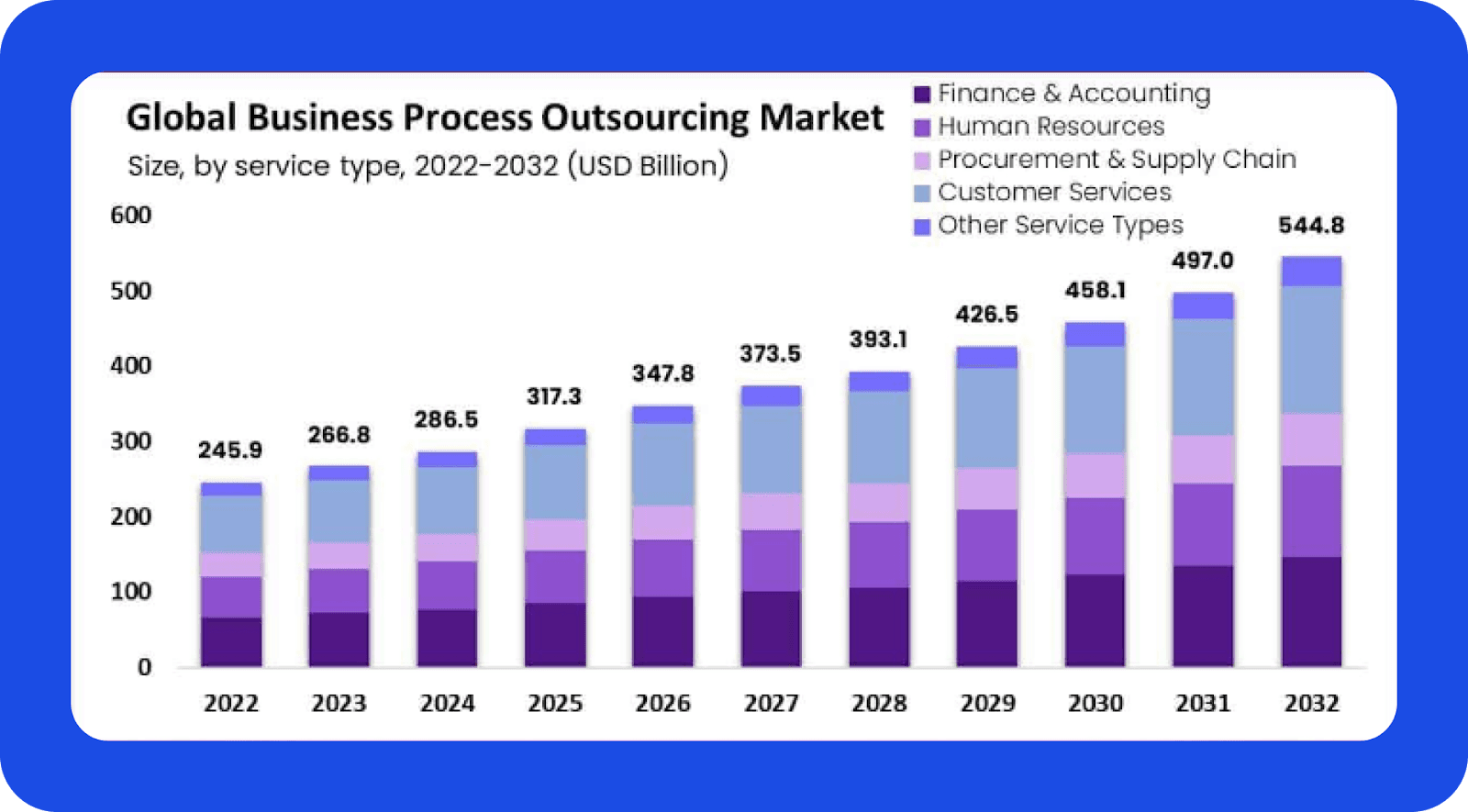
Globalisation and technological advancements fuel the rise of BPO. Companies now have access to skilled professionals and cutting-edge technology in countries with lower labour costs. This global network of BPO providers enables businesses to operate around the clock, cater to diverse markets, and manage resources more effectively. As a result, BPO has become a vital component of many organisations' growth strategies, helping them achieve scalability and innovation.
What Are the Main Types of BPO Services?
BPO practice services can be categorised into different types based on the nature of the outsourced tasks, the industry, or the geographic location of the service provider. Understanding the various types of BPO services helps businesses identify the areas they can outsource for improved efficiency and cost savings.
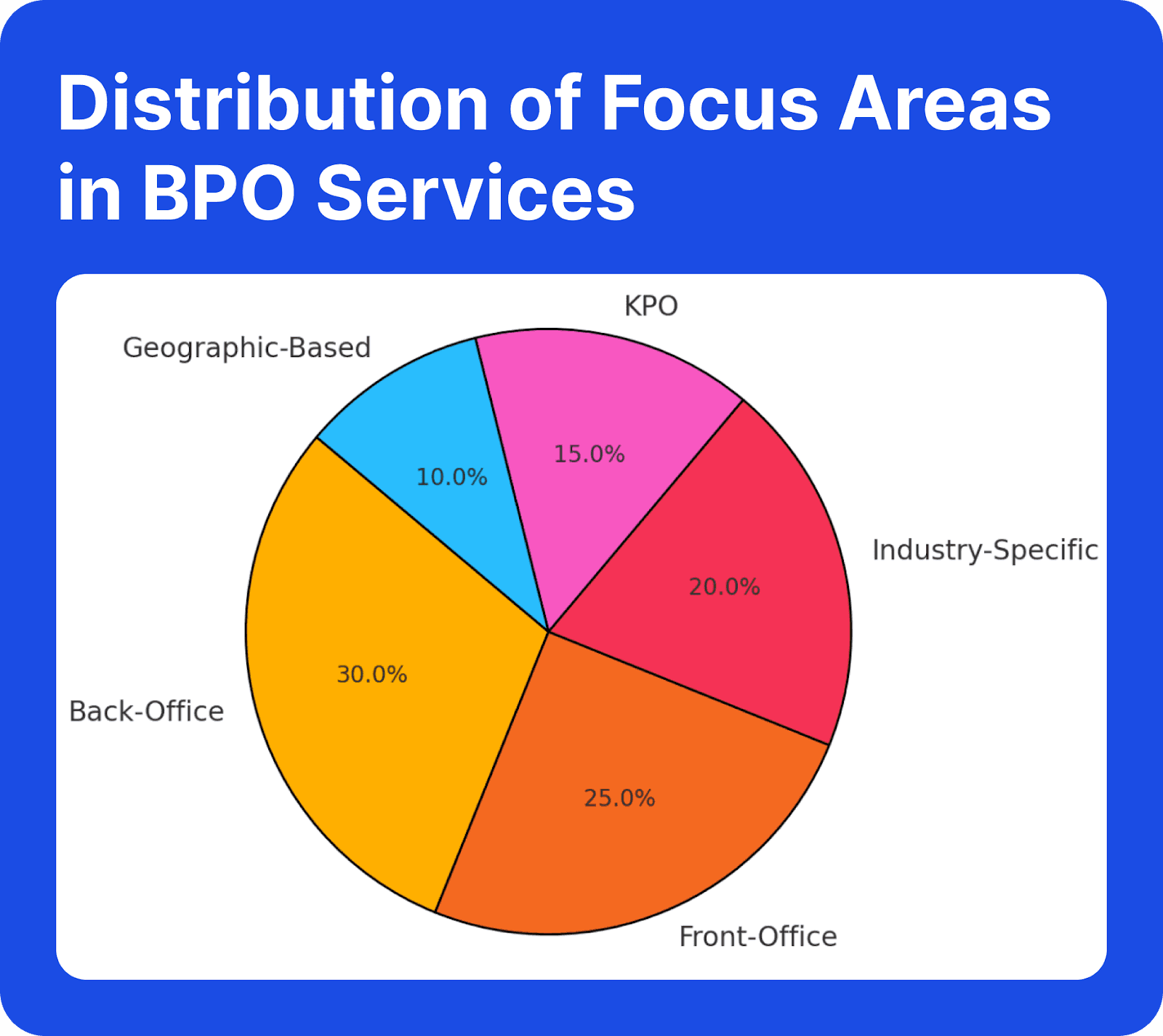
Here are the main kinds of BPO services existing nowadays:
Back-Office Services
Back-office BPO handles internal operations that support an organisation’s primary functions. While crucial for efficiency, these services do not involve customer-facing interactions. By outsourcing back-office tasks, businesses can reduce costs, improve operational accuracy, and leverage external expertise.
Finance and Accounting
Finance and accounting services include tasks like bookkeeping, payroll processing, tax preparation, accounts receivable and payable management, financial analysis, and reporting.
Outsourcing these functions allows companies to comply with local and international financial regulations, minimise errors, and access skilled financial professionals. It also facilitates better cash flow management and financial forecasting, aiding in strategic decision-making.
Human Resources (HR) Outsourcing
Human resources (HR) outsourcing encompasses recruitment, onboarding, training, performance evaluations, benefits administration, and ensuring adherence to labour laws. Businesses that outsource HR functions can streamline workforce management while focusing on strategic HR initiatives. Additionally, external HR providers often bring a larger talent pool and advanced recruitment tools.
IT Services and Data Management
IT services and data management in BPO include IT support, database administration, cybersecurity, data entry, and cloud computing services. Outsourcing these tasks enables companies to access advanced technologies and skilled professionals without investing heavily in in-house IT infrastructure. This ensures scalability, robust data security, and reliable system operations.
Front-Office Services
Front-office BPO focuses on customer-facing operations, requiring strong communication skills and problem-solving capabilities. Outsourcing these tasks enhances customer satisfaction and allows businesses to concentrate on their core competencies.
Customer Support and Call Centre Operations
This category involves handling inbound and outbound calls, addressing inquiries, resolving complaints, and providing after-sales services. By outsourcing, businesses can offer 24/7 support, improve resolution times, and reduce the workload on internal teams during high-demand periods.
Sales and Marketing Support
In this group, can be found telemarketing, lead generation, email campaigns, social media management, and CRM administration. Outsourcing these functions helps businesses execute marketing campaigns more effectively, access advanced tools, and focus on converting leads into sales. Professional expertise ensures better strategy execution and higher returns on investment.
Helpdesk and Technical Support
Helpdesk and technical support services resolve technical issues, answer product-related questions, and assist customers through various phone, chat, or email channels. Outsourcing ensures timely and efficient assistance, improving customer trust and loyalty. It also provides scalability during peak periods.
Industry-Specific BPO Services
Some industries require tailored outsourcing solutions to meet their unique operational and regulatory requirements. Industry-specific BPO providers specialise in delivering efficient and compliant services in these areas.
Healthcare and Medicine
BPO services include medical billing and coding, patient scheduling, claims processing, and telemedicine support. These services allow healthcare providers to focus on patient care while maintaining compliance with regulations such as HIPAA. Accurate billing and efficient scheduling also improve service quality.
Banking and Financial Services
Banking and financial services BPO cover loan processing, fraud detection, compliance reporting, customer account management, and financial analytics. By outsourcing, financial institutions can streamline operations, reduce costs, and ensure regulatory adherence.
Retail and E-Commerce
Retail and e-commerce outsourcing includes order processing, inventory management, returns handling, and customer support. This helps retailers manage large transaction volumes efficiently, especially during peak seasons, while ensuring seamless supply chain operations and customer experiences.
Insurance
Insurance BPO focuses on claims administration, policy servicing, underwriting, and fraud prevention. Outsourcing allows insurance companies to handle high transaction volumes more accurately and efficiently.
Knowledge Process Outsourcing (KPO)
KPO emphasises knowledge-intensive tasks requiring specialised expertise and analytical skills. These services add strategic value by enhancing decision-making and fostering innovation.
Market Research and Data Analysis
Market research and data analysis involve gathering and interpreting data to support business strategies. KPO providers deliver actionable insights, enabling businesses to optimise operations and identify growth opportunities.
Legal Process Outsourcing (LPO)
LPO includes legal research, contract drafting, patent management, and compliance audits. Law firms and corporate legal departments use LPO services to reduce costs and focus on core legal activities like negotiations and court cases.
Engineering and Design
Engineering and design services in KPO cover CAD drafting, 3D modelling, product design, and feasibility studies. These services provide access to advanced tools and technical expertise, helping companies accelerate product development and maintain high design accuracy.
Geographic-Based BPO Services
BPO services can also be classified based on the service provider's location relative to the client. Location-based outsourcing affects cost, communication, and service quality.
Offshore Sector
Offshore BPO comprises outsourcing to providers in distant countries, typically those with lower labour costs, such as India or the Philippines. This model offers significant cost savings, access to a global talent pool, and 24/7 operations by leveraging time zone differences. However, it may present challenges like cultural and language barriers.
Nearshore Sector
Nearshore BPO implies outsourcing to providers in nearby countries within the same region or time zone. This approach reduces communication barriers and cultural differences while maintaining competitive pricing. Though more expensive than offshore outsourcing, nearshore services balance cost and convenience.
Onshore or Domestic Sectors
Onshore or domestic BPO signifies outsourcing within the client's home country. It ensures cultural alignment, language fluency, and close proximity for better collaboration. However, domestic outsourcing is generally more expensive than offshore or nearshore alternatives, making it less cost-effective for businesses with tight budgets.
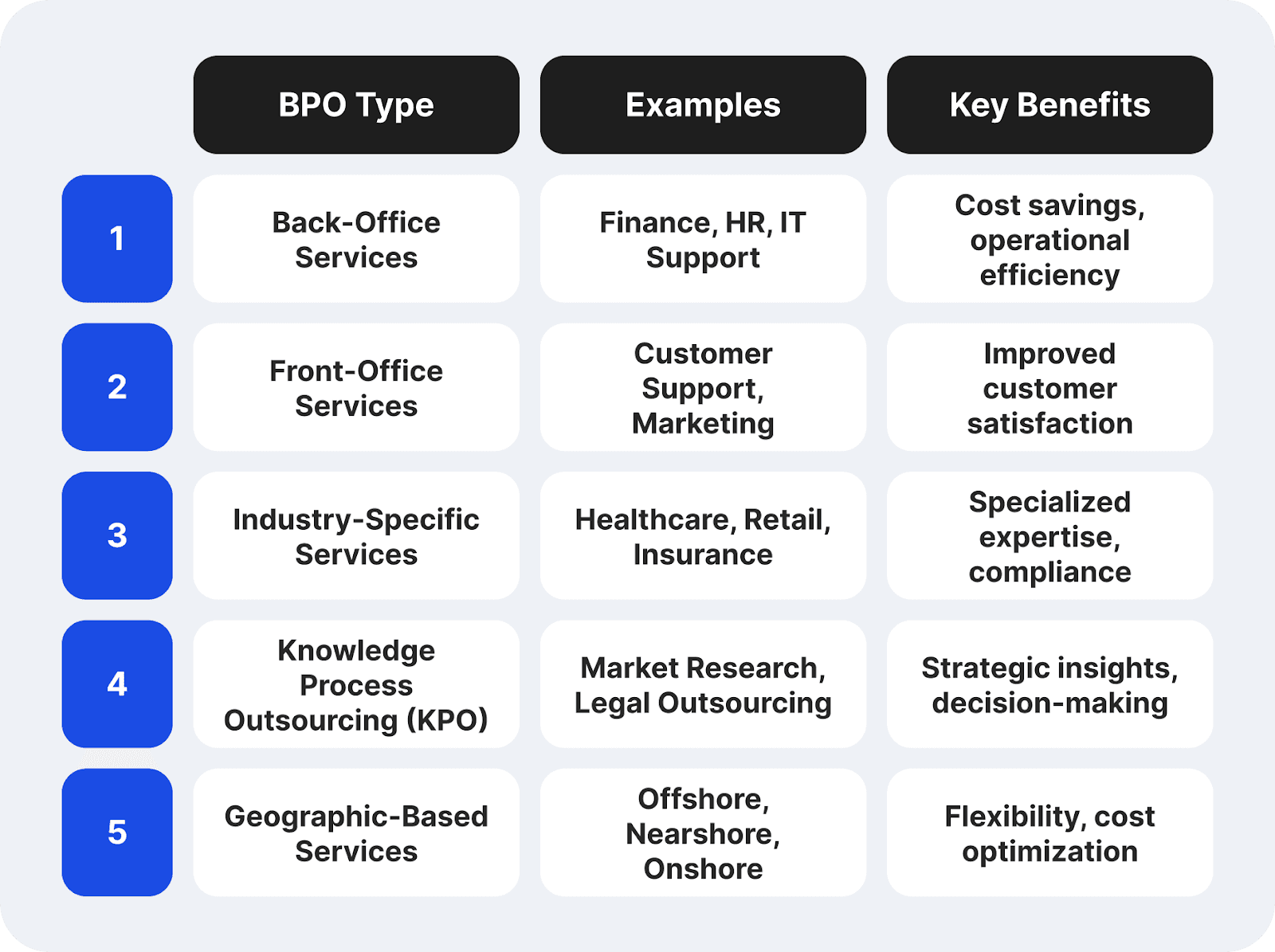
Is BPO Right for Your Business?
BPO has become a valuable tool for organisations aiming to optimise efficiency, reduce costs, and focus on their core activities. However, deciding whether BPO is right for your business depends on several factors, including your operational needs, budget, and long-term goals.
Here are some factors to look at how to determine if BPO is a good fit for your business:
Nature of Your Business Operations
Businesses with repetitive, resource-intensive tasks are ideal candidates for BPO. For example, retail, healthcare, and finance industries greatly benefit from outsourcing customer service, payroll, or claims processing.
However, companies with highly sensitive data or unique workflows may need to weigh the risks and ensure the BPO provider can meet their specific requirements.
Budget and Cost Analysis
While BPO offers cost savings, it's essential to analyse the cost of outsourcing, including provider fees, communication expenses, and transition costs. Ensure the financial benefits outweigh the investment required for a successful outsourcing arrangement.
Quality and Reliability
Selecting the right BPO provider is critical. Evaluate potential partners based on their track record, expertise, technology, and client reviews. A reliable provider should deliver consistent quality, meet deadlines, and adapt to your business needs.
Data Security and Compliance
If your business handles sensitive data, such as customer information or financial records, ensure the BPO provider complies with relevant security and regulatory standards (e.g., GDPR, HIPAA). Assess their data protection measures, such as encryption, access controls, and audit processes, to mitigate risks.
Cultural and Communication Alignment
Cultural compatibility and effective communication are essential for tasks requiring customer interaction. Consider whether the provider's location, language proficiency, and customer service approach align with your brand values and target audience.
Long-Term Goals
Assess how BPO fits into your overall business strategy. Will it help you achieve long-term objectives like market expansion, cost optimisation, or improved customer satisfaction? Outsourcing should align with your vision for sustainable growth.
Conclusion
Business process outsourcing is more than just delegating tasks—it's a strategic partnership that can drive growth, improve efficiency, and optimise costs. However, choosing the right BPO provider and aligning outsourcing with your business goals is crucial for maximising its benefits. Whether you're aiming to scale, innovate, or streamline operations, BPO offers a versatile solution tailored to meet diverse business needs.
By thoughtfully embracing BPO, you can free up valuable resources, focus on core competencies, and position your business for long-term success in an ever-evolving marketplace. The decision to outsource is not just about what you hand over—it's about what you gain in return.
FAQ
What is BPO?
BPO involves contracting specific business functions, such as customer service, HR, or IT, to external providers to enhance efficiency and reduce costs.
What are the types of BPO services?
BPO services include back-office (finance, HR, IT) and front-office (customer support, marketing) services, industry-specific solutions (healthcare, retail), and knowledge process outsourcing (KPO) for specialised tasks.
What are the key benefits of BPO?
BPO offers cost savings, access to specialised expertise, improved efficiency, scalability, and the ability to focus on core business activities.
How do I choose the right BPO provider?
Evaluate providers based on their expertise, track record, compliance with data security regulations, cost-effectiveness, and alignment with your business goals.
Read also

